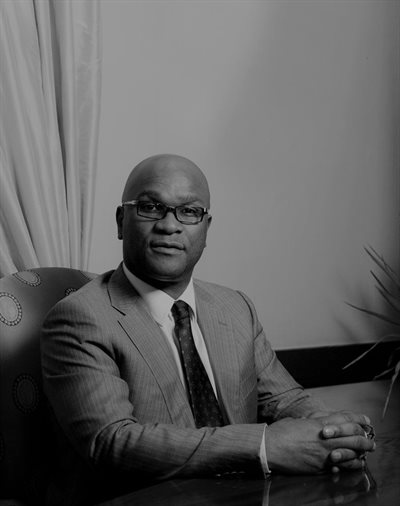On Tuesday, 28 July, at 11am precisely, Business and Arts South Africa and the Department of Sport, Arts and Culture (DSAC) kicked off a lively webinar discussion. Graciously facilitated by Metro FM’s Rorisang Thandekiso, the digital panel comprised Mr Mphikeledi Mnguni (DSAC deputy director: policy and research cultural development), Charmaine Soobramoney (Basa chairperson), Tumy Motsoatsoe (Basa head of programmes) and Cinga Dyala (former provincial winner and debut ambassador). In addition to discussion among the panel itself, there was a chance for participants to direct questions to the various panel members.

The Minister of Sport, Arts and Culture, Nathi Mthethwa
Before the conversation was convened, Basa CEO Ashraf Johaardien welcomed everyone present, and extended particular thanks for the attendance of Minister of Sport, Arts and Culture, Mr Nathi Mthethwa, who (in a special synchronicity of events), once again, opened the Debut Programme officially. The minister contextualised the launch within contemporaneous events, specifically the passing of struggle activist Andrew Mlangeni. In mourning Andrew Mlangeni, Minister Mthethwa remembered his primary goal of freedom for all. “The country is suffering under a trifecta of challenges – inequality, joblessness and poverty – and the youth of our country bears the brunt of these ills. It is the perfect time to reiterate and reinforce the original mandate of the Debut Programme, which is to lift the strictures on our artists’ livelihoods and uplift our amateur innovators into professional creators. In a time when we’ve all been forced to adjust our attitudes, how we action the Debut Programme will have to be done differently if we are to save lives and sustain livelihoods.”
Thandekiso mirrored the minister’s comments in commencing the panel debate, emphasising the programme’s role in positioning young people in the right conversations with the right skills sets, both locally but also internationally. Following on from this comment, the discussion began in earnest, with Thandekiso posing a number of pertinent questions to the panel participants.
DSAC deputy director, Mr Mphikeledi Mnguni, restated the Debut’s commitment to developing the skills of young creatives ordinarily marginalised, either because of their remote geographical location (in rural and peri-urban areas) or through their lack of access. With Basa, the partnership enables successful capacity building.
As Basa head of programmes, Boitumelo ‘Tumy’ Motsoatsoe reflected on both the successes and the challenges of the Debut Programme’s first edition, and the lessons derived to ensure an improved second edition. She acknowledges that any solutions to past problems will have to be confronted through the perspective of the Covid-19 pandemic, platform or approach, to another, is not a case of simple transference. “We are exceptionally proud of the impact of the first edition of the Debut Programme on the participants and their communities. This second edition will continue to be underpinned by social cohesion, inclusion and access, as we aim to reach 18 communities nationwide (two from each of the provinces). Beyond the critical funding the participants require, the mentorship and skills development on offer throughout the phases are essential tools to career growth. ‘Access’ is key – and this extends to our commitment to making sure our programme participants are not handicapped by logistical or administrative concerns. For instance, last year a large contingent struggled with transport issues. This year, with many of the phases planned online via digital platforms, we are certain we can alleviate the bulk of this year’s challenges through the provision of data (and the necessary resources).”
This holistic support of the creative sector was echoed in Basa chairperson Charmaine Soobramoney’s assessment of the organisation’s overall support extended to artists during the wholesale closure and cancellation of arts events as a result of the global pandemic. “We reviewed the situation, and took decisive steps to repurpose existing funding, as well as raising additional funds through both our business and artistic partners. We also conducted extensive research to ensure our financial assistance was targeted through suitable channels and to those most dispossessed. We knew we would need to make the most of the capital we had if we were to invest in relief measures that could be sustained in the long term. The Debut Programme is a further means of assistance, in that it not only provides much-needed financial support, but also facilitates the growth of success out of poverty, and contributes towards driving the economy. Right now, Basa is wholly focused on helping where it can.”
The panel’s final participant was the Debut Programme’s first edition Eastern Cape provincial winner and programme ambassador, Cinga Dyala. Cinga was effusive in her praise for the programme’s support, both during the process itself, as well as the long-term benefit of having participated. “The programme is representative of talented people who just need a break; it provides confirmation that committing to your vision will see it realised. We were exceptionally grateful for the prize money, as it allowed us to buy equipment necessary to allow us licence to pilot our own projects, without relying on others. We’ve also been able to ‘pay it forward’, in that the money has also been put towards establishing a formal company identity, and to host industry events. What was an unexpected boon was the expert, behind-the-scenes business knowledge we gained. I believe this was crucial to how we’ve adjusted to the current situation – we were able to adapt our business model accordingly. At present, we are still creating brand awareness through masks we’ve manufactured, with our company logo and tagline embroidered on them.”
Basa has opened applications for the second edition of the Debut Programme partnered by DSAC until 31 August 2020. Applications are being facilitated via WhatsApp, as a means to increase access and applicants will be able to apply in English, Afrikaans, Sepedi or isiZulu.